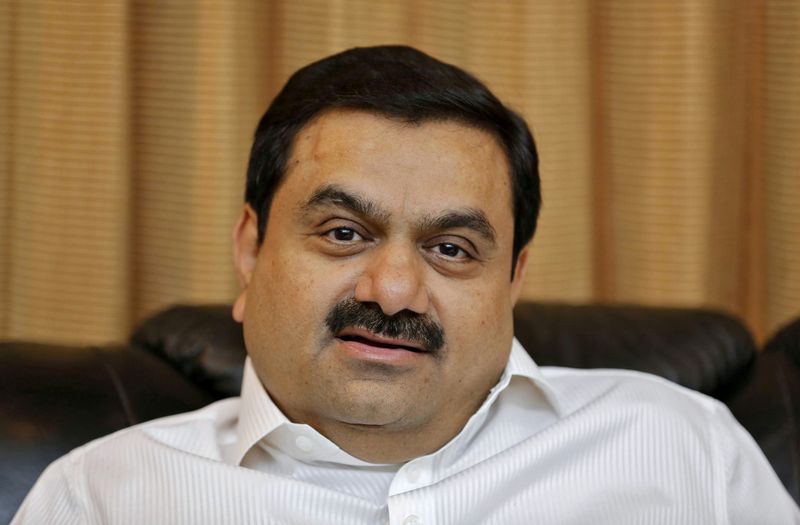
NEW DELHI (Reuters) – Indian billionaire Gautam Adani has been indicted by U.S. prosecutors for conspiring with executives of a formerly New York listed company to devise a $265 million scheme to bribe Indian officials to boost their solar energy business.
Adani Group denied the allegations as “baseless”, while Indian government officials haven’t commented so far.
Here is an overview of the investigation and allegations revealed in the U.S. indictment:
WHAT ARE THE MAIN ALLEGATIONS?
U.S. prosecutors charged Gautam Adani, his nephew Sagar Adani who is director at Adani Green, and six others with alleged bribery and fraud related to renewable energy projects in India that benefitted the tycoon’s company and India’s Azure Power, which was listed on the NYSE until late 2023.
In 2020, the unsealed indictment from Wednesday shows, executives of Adani Green and Azure “knowingly and wilfully conspired” and agreed to “corruptly” offer, authorise and pay bribes to government officials in India to “obtain or retain business advantages”.
Adani and his executives have also been accused of making false and misleading statements to investors and lenders in the United States regarding the company’s anti-bribery commitments and practices while raising money from them.
Between 2021 and 2024, Adani raised more than $3 billion in loans and bonds, including from investors in the United States.
“Gautam and Sagar Adani were engaged in the bribery scheme during a September 2021 note offering by Adani Green that raised $750 million, including approximately $175 million from U.S. investors. The Adani Green offering materials included statements about its anti-corruption and anti-bribery efforts that were materially false or misleading,” the U.S. Securities and Exchange Commission said.
The Adanis earlier this year made misleading statements to the public, the Indian stock exchange and investors despite being made aware of the U.S. investigation in 2023, the prosecutors alleged.
HOW WERE BRIBES TRACKED, PAID?
Sagar Adani, executive director of Adani Green and nephew of Gautam Adani, used his mobile phone to track details of the bribes offered to Indian officials, U.S. authorities alleged.
Executives from Azure also prepared an analysis using Excel and PowerPoint to summarise the different ways in which it could repay Adani Green for the bribes it had paid to benefit both companies.
One way discussed was to describe the payment internally at Azure as a “development fee”, but it instead used another option of getting Azure to transfer one of its projects to Adani in lieu of part of the payment, U.S. authorities alleged.
Azure in a statement said former officers of the company referenced in the U.S. indictment were no longer associated with the company, and the company continued to cooperate with U.S. authorities.
WHAT WERE THE POWER PROJECTS IN QUESTION?
U.S. authorities called the dealings in their indictment “The Corrupt Solar Project”.
Between 2019 and 2020, Adani Green and Azure were awarded renewable energy tenders by Solar Energy Corporation of India (SECI), a federal government-owned entity.
The project involved building solar plants in several Indian states.
U.S. authorities alleged Adani and others devised a scheme to bribe Indian state government officials to enter into agreements with SECI, “which would benefit” Adani subsidiaries and Azure.
HOW DID U.S. FEDERAL AGENTS INVESTIGATE, SEIZE EVIDENCE?
In March 2023, FBI special agents approached Sagar Adani with details of the grand jury’s ongoing investigation into the group and other entities. They took custody of electronic devices in Sagar’s possession and served him with a search warrant and grand jury subpoena.
The search warrant identified offences, individuals and entities under investigation by the U.S. for violations of the Foreign Corrupt Practices Act, securities fraud, and wire fraud.
WHAT’S NEXT FOR THE ADANI GROUP?
Adani Group in a statement said it would seek “all possible legal recourse”.
Indian lawyers said there was a possibility the matter could be settled between the Indian tycoon and U.S. authorities, and the billionaire can also seek a dismissal of the indictment.
Debopriyo Moulik, a criminal lawyer in New Delhi, said that since an arrest warrant had been issued by U.S. authorities, they would have to approach the Indian government through the Indian embassy to execute it.
The grand jury in its order said if any of the executives were found guilty of the charges they would have to forfeit any property or proceeds derived directly or indirectly as a result of the offences.






